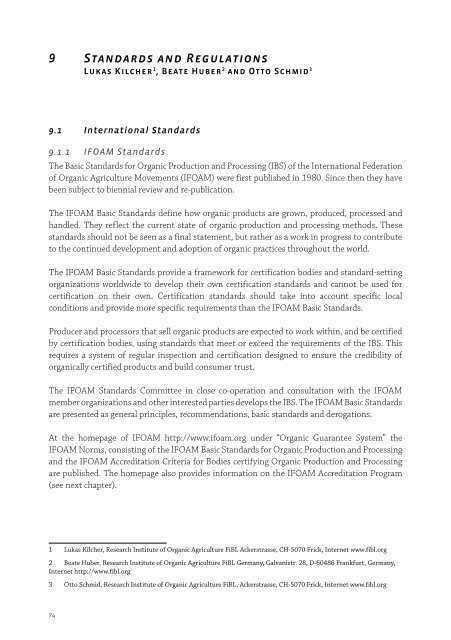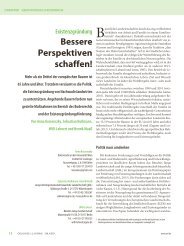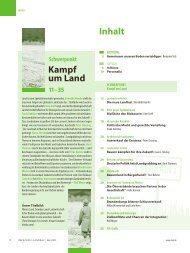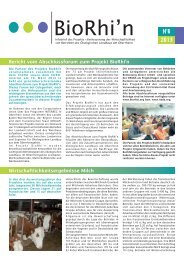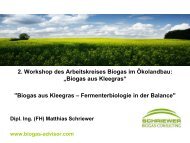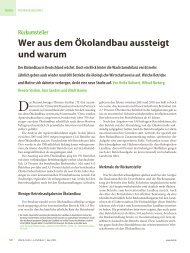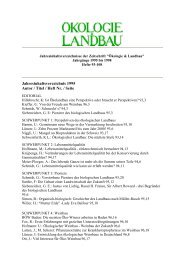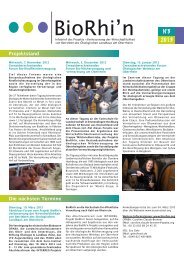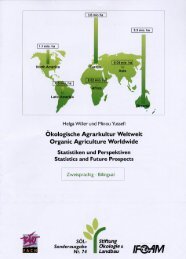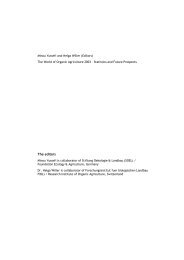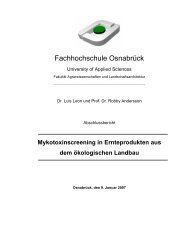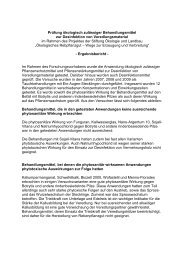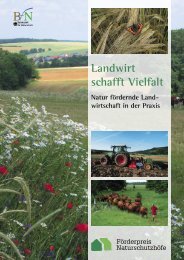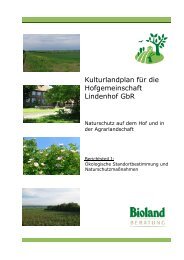the world of organic agriculture - Organic Eprints
the world of organic agriculture - Organic Eprints
the world of organic agriculture - Organic Eprints
You also want an ePaper? Increase the reach of your titles
YUMPU automatically turns print PDFs into web optimized ePapers that Google loves.
9 Standards and Regulations<br />
Lukas Kilcher 1 , Beate Huber 2 and Otto Schmid 3<br />
9.1 International Standards<br />
9.1.1 IFOAM Standards<br />
The Basic Standards for <strong>Organic</strong> Production and Processing (IBS) <strong>of</strong> <strong>the</strong> International Federation<br />
<strong>of</strong> <strong>Organic</strong> Agriculture Movements (IFOAM) were first published in 1980. Since <strong>the</strong>n <strong>the</strong>y have<br />
been subject to biennial review and re-publication.<br />
The IFOAM Basic Standards define how <strong>organic</strong> products are grown, produced, processed and<br />
handled. They reflect <strong>the</strong> current state <strong>of</strong> <strong>organic</strong> production and processing methods. These<br />
standards should not be seen as a final statement, but ra<strong>the</strong>r as a work in progress to contribute<br />
to <strong>the</strong> continued development and adoption <strong>of</strong> <strong>organic</strong> practices throughout <strong>the</strong> <strong>world</strong>.<br />
The IFOAM Basic Standards provide a framework for certification bodies and standard-setting<br />
organizations <strong>world</strong>wide to develop <strong>the</strong>ir own certification standards and cannot be used for<br />
certification on <strong>the</strong>ir own. Certification standards should take into account specific local<br />
conditions and provide more specific requirements than <strong>the</strong> IFOAM Basic Standards.<br />
Producer and processors that sell <strong>organic</strong> products are expected to work within, and be certified<br />
by certification bodies, using standards that meet or exceed <strong>the</strong> requirements <strong>of</strong> <strong>the</strong> IBS. This<br />
requires a system <strong>of</strong> regular inspection and certification designed to ensure <strong>the</strong> credibility <strong>of</strong><br />
<strong>organic</strong>ally certified products and build consumer trust.<br />
The IFOAM Standards Committee in close co-operation and consultation with <strong>the</strong> IFOAM<br />
member organizations and o<strong>the</strong>r interested parties develops <strong>the</strong> IBS. The IFOAM Basic Standards<br />
are presented as general principles, recommendations, basic standards and derogations.<br />
At <strong>the</strong> homepage <strong>of</strong> IFOAM http://www.ifoam.org under “<strong>Organic</strong> Guarantee System” <strong>the</strong><br />
IFOAM Norms, consisting <strong>of</strong> <strong>the</strong> IFOAM Basic Standards for <strong>Organic</strong> Production and Processing<br />
and <strong>the</strong> IFOAM Accreditation Criteria for Bodies certifying <strong>Organic</strong> Production and Processing<br />
are published. The homepage also provides information on <strong>the</strong> IFOAM Accreditation Program<br />
(see next chapter).<br />
1 Lukas Kilcher, Research Institute <strong>of</strong> <strong>Organic</strong> Agriculture FiBL Ackerstrasse, CH-5070 Frick, Internet www.fibl.org<br />
2 Beate Huber, Research Institute <strong>of</strong> <strong>Organic</strong> Agriculture FiBL Germany, Galvanistr. 28, D-60486 Frankfurt, Germany,<br />
Internet http://www.fibl.org<br />
3 Otto Schmid, Research Institute <strong>of</strong> <strong>Organic</strong> Agriculture FiBL, Ackerstrasse, CH-5070 Frick, Internet www.fibl.org<br />
74


